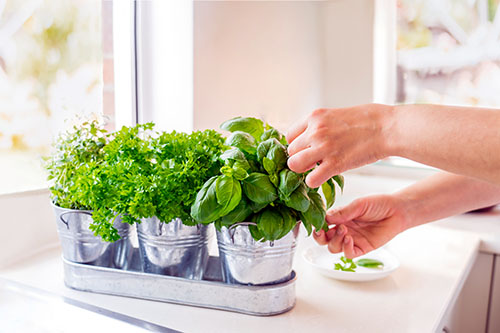Preserving Homegrown Herbs
May 25, 2021

This spring and summer, homegrown herbs such as basil, oregano, thyme, and rosemary will be found in abundance in many gardens, producing plenty of flavor options for home chefs looking to add some pizzaz to their meal. Many gardeners might find this bounty to be more than they are able to use, but there are several easy techniques that will preserve your fresh herbs for year-round enjoyment.
Harvest your herbs after their flower buds appear but before they open to ensure you get the highest concentration of essential oils. Aromatic herbs possess more flavor when harvested earlier in the day, but you will want to wait until after the dew has evaporated if you are planning to dry the herbs.
Air-drying
Air-drying is the most common way to preserve herbs because of its ease and effectiveness. Tie the stems in a cluster and hang in a well-ventilated room away from direct sunlight. You can also spread herbs across a screen or rack and place in an area that allows good air circulation around the leaves. Store the dried herbs in an airtight container such as a jar or glass bottle and place in a dark, dry place to preserve the potency of the herbs. This method is especially good for herbs such as rosemary, thyme, and sage.
Microwave-drying
Using a microwave to dry your herbs is a speedier alternative to air-drying and can be useful in damp climates. Place individual leaves on a paper towel in the microwave and cover with another layer of paper towels. Heat the herbs in the microwave for one to three minutes, checking the leaves every 20 seconds to make sure they are drying evenly and do not need to be flipped. You will know your herbs are ready to be stored in an airtight container for later use when they are crunchy to the touch.
Freezing
Freezing is often the best way to preserve the intense flavor of certain herbs such as parsley and oregano. Simply rinse the herbs, pick the leaves from the stem, and let the leaves dry on a tray. If you freeze the leaves on the tray before storing in a Ziploc bag, the leaves will be easily separated, whereas freezing the leaves in a bag will result in a clump of herbs that can be chopped up to add to sauces and soups.
Following one of these smart, practical methods will help you to avoid wasting excess herbs this summer and allow you to enjoy their savory taste all throughout the year. For herb seeds and plants or for more helpful advice on herb gardening or preservation techniques, visit your local Co-op. Find the nearest location here.
For more content like this, check out the latest issue of the Cooperator.
Harvest your herbs after their flower buds appear but before they open to ensure you get the highest concentration of essential oils. Aromatic herbs possess more flavor when harvested earlier in the day, but you will want to wait until after the dew has evaporated if you are planning to dry the herbs.
Air-drying
Air-drying is the most common way to preserve herbs because of its ease and effectiveness. Tie the stems in a cluster and hang in a well-ventilated room away from direct sunlight. You can also spread herbs across a screen or rack and place in an area that allows good air circulation around the leaves. Store the dried herbs in an airtight container such as a jar or glass bottle and place in a dark, dry place to preserve the potency of the herbs. This method is especially good for herbs such as rosemary, thyme, and sage.
Microwave-drying
Using a microwave to dry your herbs is a speedier alternative to air-drying and can be useful in damp climates. Place individual leaves on a paper towel in the microwave and cover with another layer of paper towels. Heat the herbs in the microwave for one to three minutes, checking the leaves every 20 seconds to make sure they are drying evenly and do not need to be flipped. You will know your herbs are ready to be stored in an airtight container for later use when they are crunchy to the touch.
Freezing
Freezing is often the best way to preserve the intense flavor of certain herbs such as parsley and oregano. Simply rinse the herbs, pick the leaves from the stem, and let the leaves dry on a tray. If you freeze the leaves on the tray before storing in a Ziploc bag, the leaves will be easily separated, whereas freezing the leaves in a bag will result in a clump of herbs that can be chopped up to add to sauces and soups.
Following one of these smart, practical methods will help you to avoid wasting excess herbs this summer and allow you to enjoy their savory taste all throughout the year. For herb seeds and plants or for more helpful advice on herb gardening or preservation techniques, visit your local Co-op. Find the nearest location here.
For more content like this, check out the latest issue of the Cooperator.